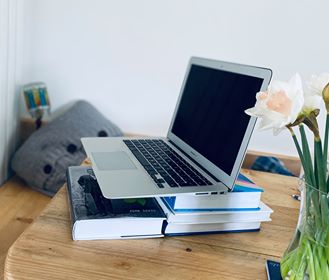Home Office Made Easy
- Emma Mersseman

- Apr 1, 2020
- 3 min read
In these times of need and extreme circumstance suddenly many of us need to find space in our homes to work. However, you might be surprised how easy it can be.....
If you're anything like me, you may well feel bombarded by the many factors that you now have to consider with online communication:
~ The location for your BEST wifi connection.
~ Whether the CAT or DOG want to sit on your lap during a call!?
~ Probably most importantly, that the top half of you is WELL DRESSED!
~ The added stress of getting the lighting right so they can actually SEE YOU.
~ What others can see BEHIND you, let alone any NOISE that might be coming from outside or the room next door.
~ How to set up a USER FRIENDLY office space at home for long-term use.
Well, I won't say I can help with ALL of those issues, but here are a few tips to keep you working effectively and without the addition of pain or injury from long hours sitting at a poorly put together office space.
Safe & Simple Ergonomics
1. SCREEN HEIGHT - The most important guideline is to ensure the screen is at eye level when sitting in an upright posture.
When using a laptop, this can be done by using a stand. I highly recommend the one in the picture below (tiny.cc/gfqamz). I, or should I say we both use it all the time at home, it's a great addition, it's quick and easy to set up and portable.
If you don't have a stand, or you just need to raise the screen of your computer, the next best thing is to use something accessible such as books, these can be altered to suit your ideal height. If you can, get someone else to check your positioning and screen height, it's harder to check yourself, particularly if you have been used to slouching with your head and eyes looking downwards towards a screen.
2. BACK SUPPORT - Great back support often comes from a good office chair, however, good office chairs are not cheap and possibly not accessible at this time.
You will be pleased to know there are some additions that can assist from items in your own home. A small cushion or rolled up towel placed in the arch of your lower back will actually help to support your upper back. That in turn will help shoulder placement. The size of this cushion or towel will depend on the depth of that curve in your lower back. If you have a deep curve a larger support will be required, if you are quite flat through this lower area, obviously a small support will do. Play with it. Remember though the cushion/ towel is to support your back, not press into it.
3. ELBOWS - Ideally you want your elbows at around right angles from your body to the desk (see image below). You should be close enough to the desk that your upper arms are relaxed by your sides.
4. WRISTS - If your elbows are well placed there will be less stress on your wrists. Wrists rests are helpful if you have them, however when at home, you can simply use a small rolled up towel placed under the wrists. This reduces the tension through the forearm. Done.









Comments